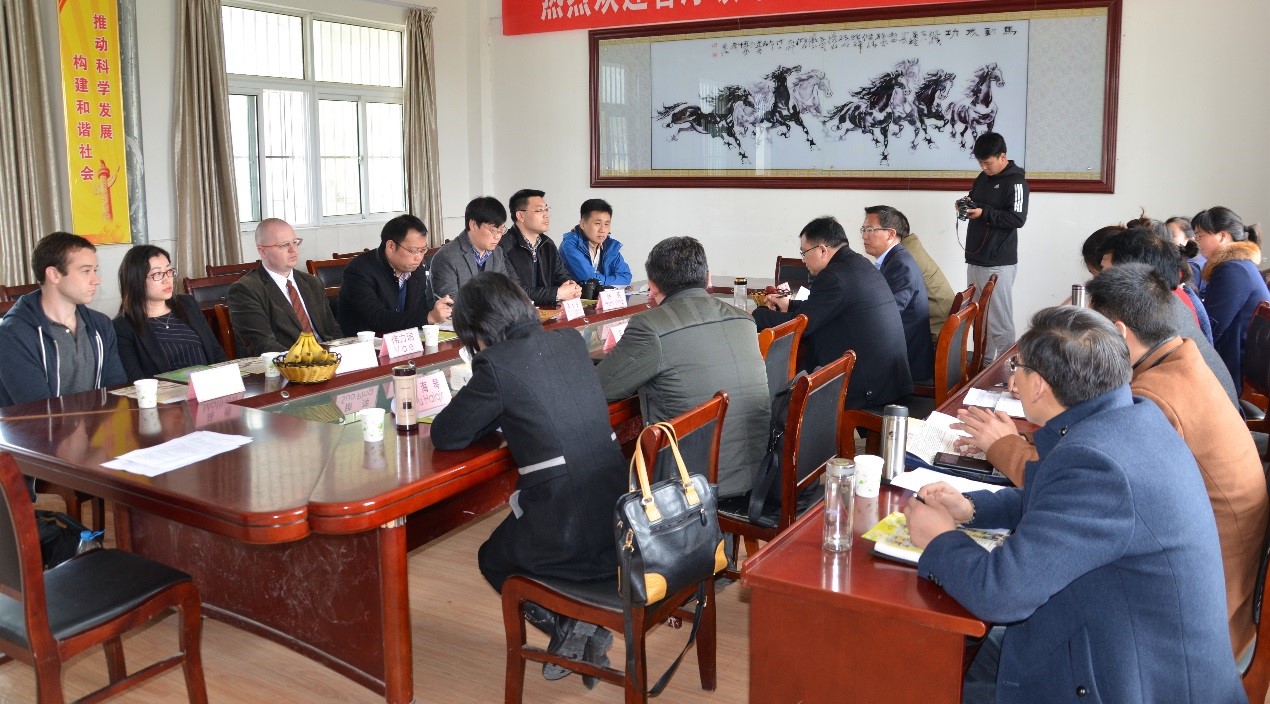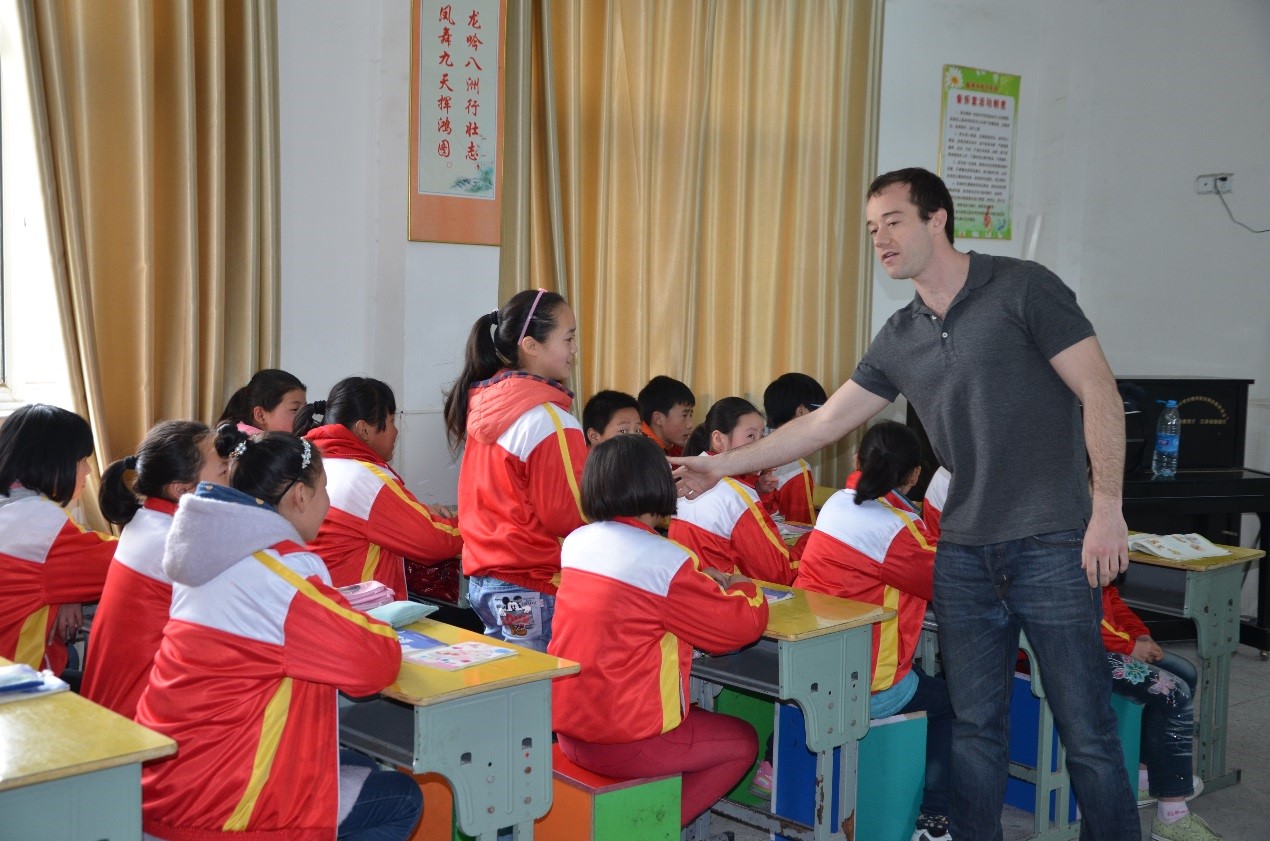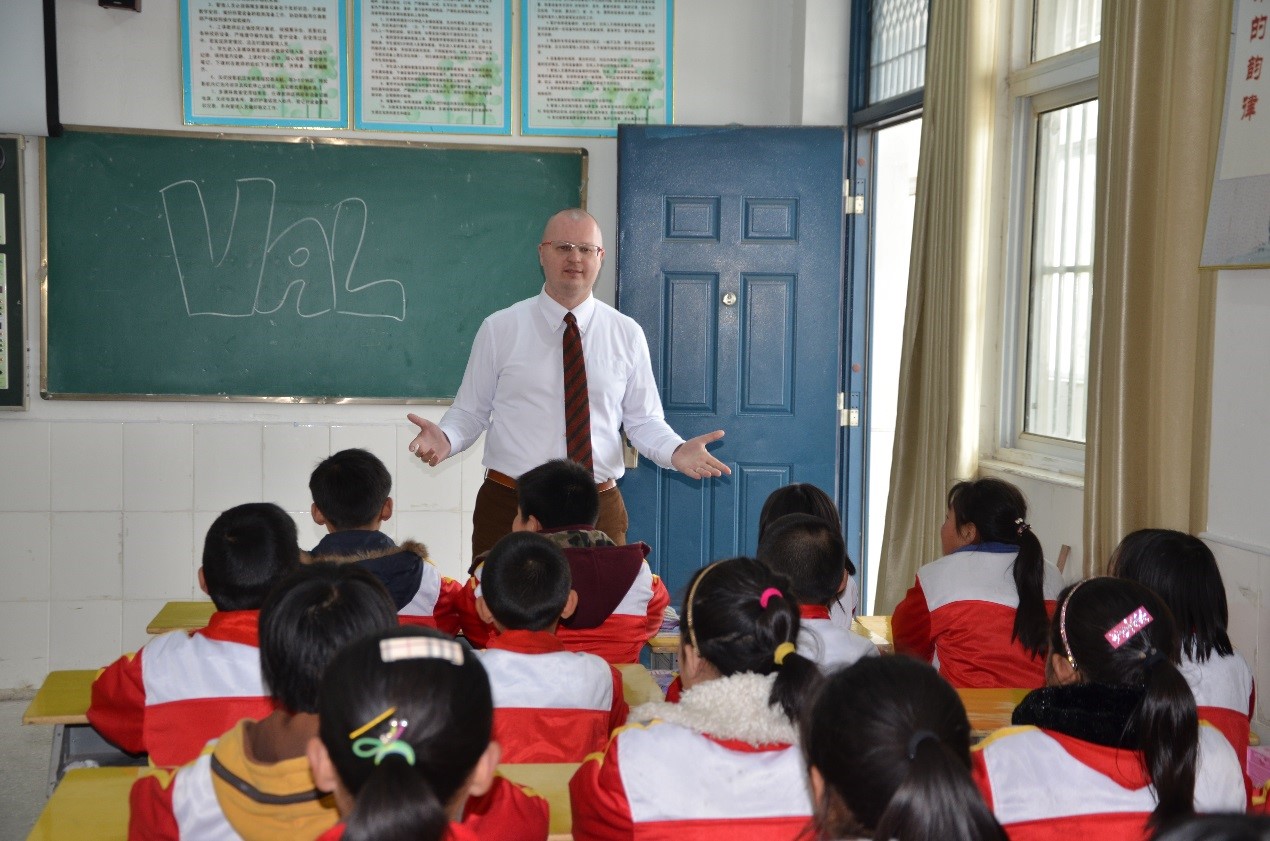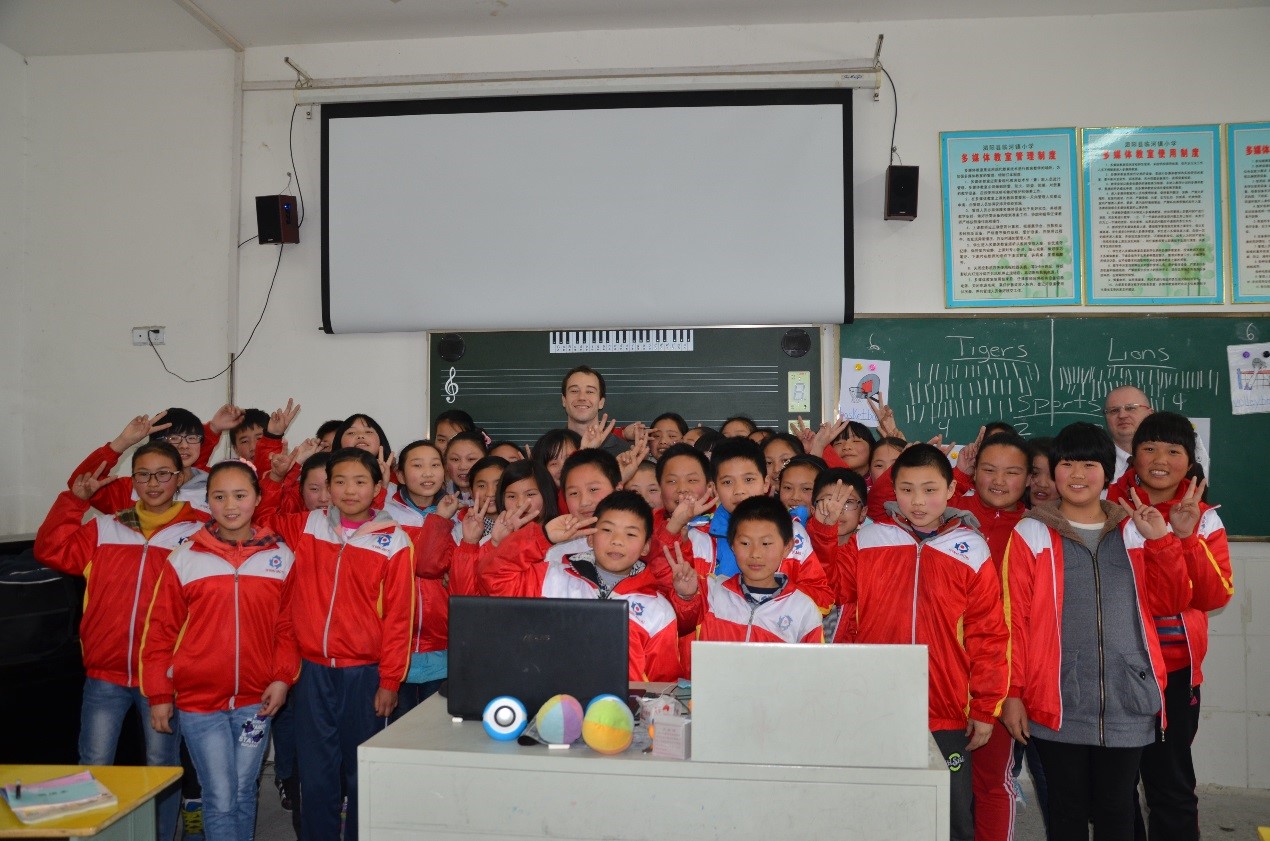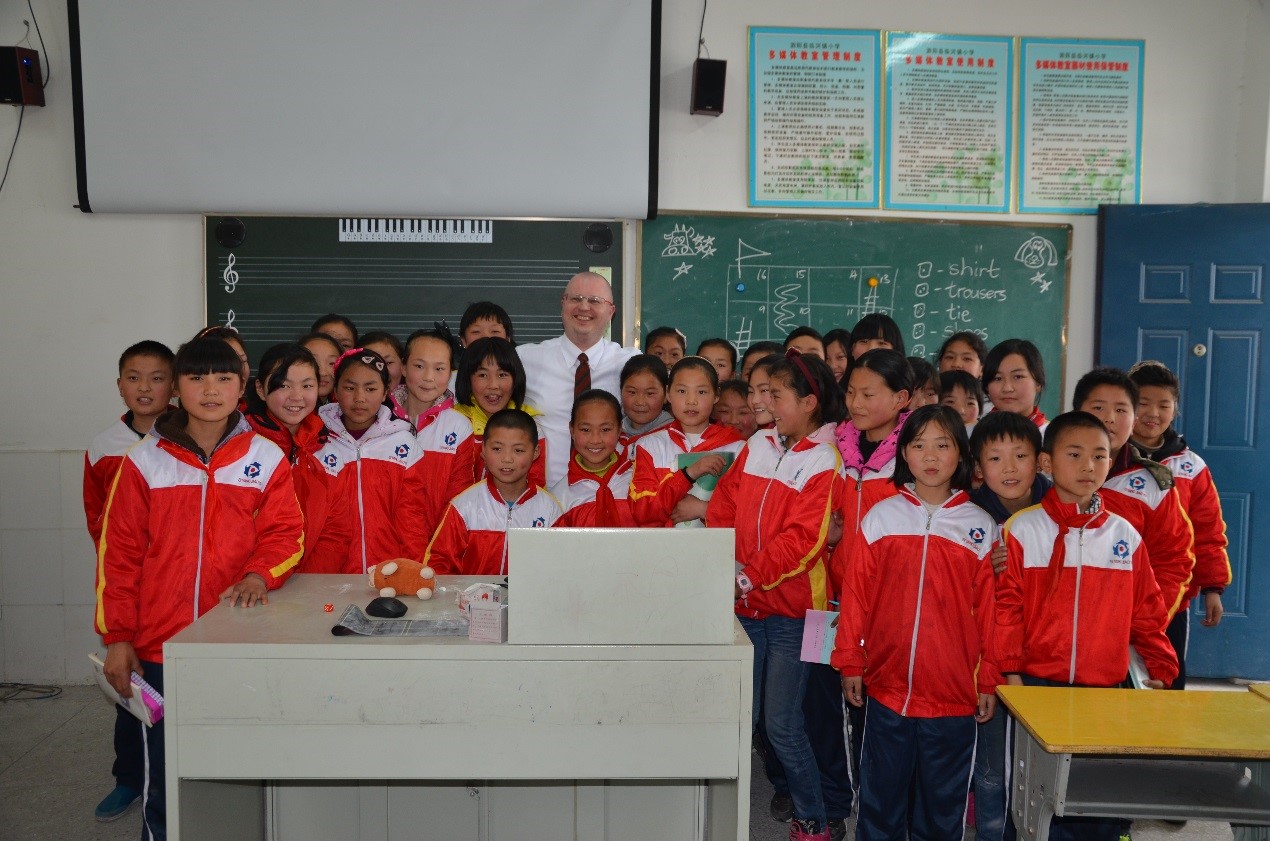2016.4.13 - JESIE Open Day - XVIII
On April 7th 2016, five of JESIE's staff, including two teachers, headed deep into Jiangsu Province to Siyangxian Linhezhen Primary School in Siyang County. Siyang County, famous for its poplar tree, is under the administration of Suqian, just to the Northwest of Huai'an. This day was more than just a JESIE Open day, because this school has never had any foreign teachers on their campus. Only one of the teachers there had met a foreigner before this day and as such were extremely delighted and excited to speak with JESIE's foreign staff.
Upon arrival at the school, JESIE's staff were greeted by the school's principal and other staff, as well as, a woman filming with a professional style camera.The students, who were enjoying a P.E. lesson outside, immediately lost focus on their class in order to catch a glimpse of the two foreigners who were standing nearby. After some simple introductions, JESIE staff, joined by all the school's English teachers, administration, some other staff, and the local leaders of Siyang's Department of Education, gathered together in a meeting room.
The purpose of this meeting was for Siyang's English teachers to find out from JESIE's staff how to better improve their students' oral English. They were very curious about the best methods and some effective games that could get their students to become more vocal in class using English. Of course JESIE's staff did their best to explain some effective methods and assured them that during today's Open Day they would get the chance to see our methods first hand. The teachers and administration were obviously very happy to hear about teaching English from a foreigner's perspective and were actively jotting down notes. Once all the teachers' questions were answered, JESIE's staff along with the administration from Siyang County had lunch together.
After the delicious lunch, it was time for the two JESIE teachers on hand, Matthew and Val, to give demo lessons. The first demo class, given by Matthew, was for a group of 6th grade students, as well as, around 20 of the school's teachers and staff. Once class began Matthew did his best to break the ice with this class by asking them "What's your name?", "How are you?", and "How old are you?" The class was visibly nervous as none of them had ever seen a foreigner before, not to mention actually interacted with one. After the introductions, Matthew jumped right into the topic of the day, which was sports, by introducing six sports along with some associated actions. He also introduced a simple sentence to test their level and ability to produce an entire sentence. Each word of the sentence "I can play football." and "I can't play football."was accompanied by an action. Once confident that they knew and could say this simple sentence Matthew played several games to let the class have some fun while also saying these sentences. The class was split into two teams and Matthew put the flashcards for each word on the board. Then the students were given a soft ball and told to throw the ball at a word of their choice. If they could hit the word with the ball and say the sentence "I can/can't play (sport)." They were given points. The next game really broke the students out of their nervous shells. Matthew handed both teams a soft ball and played music while they passed the ball to each other. When the music randomly stopped, the student holding the balls needed to say the vocabulary word and sentence of the flashcard Matthew was holding. The students loved this game for its unpredictability. The third game was an action miming game with the sentence "I can/can't play (sport)." Matthew would either mime the sentence and have two students produce the sentence as quickly as they could, or mime the sentence to two students who could see him and then have them mime the sentence to their teammates who would then need to say the sentence. The first team to produce the correct sentence would earn points for their teams. The final game was an egg spoon race with a twist. First Matthew would ready the students at the starting line holding their spoon with a ping-pong "egg" and then mime a sentence without saying anything. Then the students raced to the front of the room holding their "egg" in their spoon carefully. The first student to reach the front needed to touch the desk and say the previously mimed sentence. If successful, a point was awarded to the student's team. At the end of the class all of the students could easily produce the sentences "I can/can't play (sport)" and their pronunciation was perfect.
The second demo class, given by Val, was for a lucky group of 5th graders as well as the 20 school teachers and staff who watched the previous lesson. Val began his lesson with the warm up question of "How are you?" After a few students gave the response "I'm fine", Val decided to teach them some more responses to broaden their vocabulary and make them sound more natural. After the class was good and warmed up, Val introduced the topic of the day, "Clothes" and six articles of clothing. First he focused on the pronunciation of all the words and then played a quick game. Before the game, Val taught the important classroom English of "heads up" and "heads down" with actions and had the students repeat his actions before actually having them put their heads down and keep them there. He then removed the flashcards one by one and had the students take turns recognizing the missing flashcard for points. Val then moved on to teaching the answer "I have a (article of clothing)." with associated actions for each word. Next he wrote the question "What do you have?" on the board and brought up a student and put them under each word of the sentence, including the question mark. Each student would say the word of the sentence they were standing under and then the last person would do the action for the question mark. Once Val was certain the students could produce the correct pronunciation and understood of the meaning of the question and answer, he played a game to reinforce this new knowledge. The game Val chose to play was Chutes and Ladders. He quickly drew a game board on the black board and explained the rules. Then he brought up a student from each team to have a go rolling the dice. Each number of the dice was assigned an article of clothing. For example, 1 was a shirt and 6 was a jacket. If the students rolled a 6 they got to move 6 spaces and then had to say the sentence "I have a jacket." If they could produce this sentence correctly their team got to move its game piece 6 spaces. The first team to reach the end of the game board was the winner. This game was a big hit and all of the students were really into it.
Once the class was over and JESIE's staff moved outside to depart from the school, they were given the celebrity treatment. Many students wanted to get autographs from JESIE's foreign teachers and the staff and teachers of the school took many to have a record of this historic day. Everyone was very excited and JESIE's staff left with a huge smiles on their faces.
This was not just a normal JESIE Open Day. There was a real air of gratitude toward JESIE's staff for making the journey to this small school to take the time to share some different techniques, as well as, interact with the students and teachers there. Most of JESIE's Open Days happen in schools that already have a foreign teacher from JESIE working in them on a daily basis, so the students and teachers there are used to it. However, Siyangxian Linhezhen Primary School has never had a foreigner, so this was truly a special day for them and not something I think they will soon forget. It is situations like this that really make working for JESIE an even more rewarding experience. Getting to be a part of something that will hopefully change the lives of some underprivileged students is not something that every English teacher in China has the opportunity to do. Most foreign teachers in China teach students who do not come from poor families because it is expensive to have a foreign teacher. This is just the nature of the current situation in China right now. JESIE is looking to push the boundaries of what is the current norm for English education in China and reach students who are underprivileged. This is one of the things about JESIE that truly make it a unique and special place to work. It is this attitude and outlook on education that is, and will continue to propel JESIE to higher places in the hearts and minds of the people of Jiangsu Province. Another JESIE Open Day to reflect and be proud of is in the books. HAPPY April everyone!
